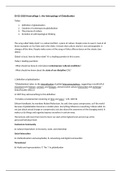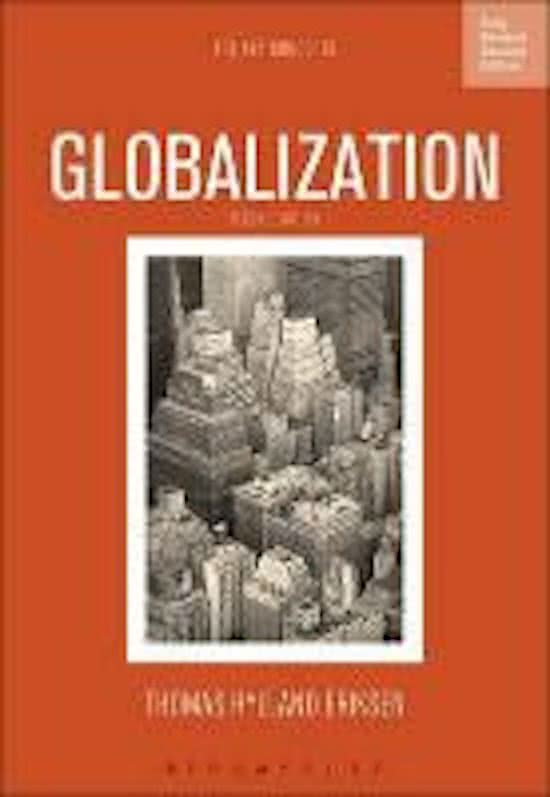05-02-2020 Hoorcollege 1: the Antropology of Globalization
Today:
1. Definition of globalization
2. Catalysts of contemporary globalization
3. The process of culture
4. Evolution of anthropological thinking
The song called ‘Baby shark’ is a cultural artifact, a piece of culture. People come to own it, look at all
those examples on YouTube and in the slides. It shows that culture clearly is not unchangeable. It
changes all the time. People make covers of the song or Police officers dance on the streets (see
slides).
Global vs local, how do they relate? It’s a leading question in this course.
Today’s leading questions:
- What should we keep in mind about contemporary cultural conditions?
- What should we know about the state of our discipline (CA)?
1.Definition of globalization
“[Globalization] refers to the intensification of global interconnectedness, suggesting a world full of
movement and mixture, contacts and linkages, and persistent cultural interaction and exchange.”
(Inda/Rosaldo 2002:2)
In 2007 they add something to this definition:
“It implies a fundamental reordering of time and space.” (I/R. 2007:8)
Erikson Handbook, he mentions Roland Robertson, he said: time space compression, as if the world
because of globalization becomes a smaller place. Everything influences everything. Erikson adds: its
not just about actual change or compression, but also about the awareness of the changing world. It
makes us do things and organize/express ourselves in certain ways.
The lectures will move from level to level, we start at the highest level and end up at the
personal/individual level:
Contexts & Community
2. Cultural imperialism; 3. Economy, state, and citizenship
Social Interaction
4. Multiculturalism and xenophobia; 5. networking and digital communities
Personhood
6. Media and representation; 7. The ‘I’ in globalization
,2. Catalysts of contemporary globalization
Globalization: key concepts (Eriksen)
Disembedding, it is about disconnection/delocalization:
2 kinds:
1. Between social life/context and local context, the social connection you have do not need to
take place in your local environment. You can have friends online and stuff like that.
2. Cultural forms and dislocation, they spread about the world, and disconnect from the place
of origin.
Speed, change happens at a increasingly high pace. People across the world experience things at the
same time, although they are not at the same place.
Standardization, about for example languages, today on an unprecedented scale.
Connections, about the expansion of transnational networks.
Mobility, people on the move, migration shit.
Mixing, it happens all the time, mixing today occurs at a scale and speed that no one ever
experienced before.
Risk, Mexican migrants, Corona/Zika virus, Cyber insecurity, Russians hacking our pc’s
Identity Politics, this has to do with where do you belong, who are you and who are the people
around you?
(Alterglobalization), critical response of people, dark side of globalization, all about the responses of
disembedding.
3. The process of culture
Since the 1980s, global transformation and changes in the anthropological perspective on culture.
Common ingredients in definitions of (contemporary) globalization:
1. Neoliberalism & economic interdependence
2. Redefined role nation-state: transnational flows
3. Contact & exchange (technological advancement), smartphones and stuff: increase of speed like
communication etcetera.
4. Intertwinement local and global processes
Arjun Appadurai: al ways of thinking about culture are inadequate.
New global cultural economy:
- It’s a relation between culture, politics and economy, we can’t see culture separate.
- Imagined worlds, how things are experienced or imagined. Individuals live in a world today
that is to a large extent imagined. These imagined world are based upon a understanding of
, reality that has a clear (iets in deze trant) historical context. The worlds are productive, they
shape our thinking.
- 5 scapes, buildings bricks of imagined worlds, 5 different types of building blocks/bricks.
o Ethno scape. Landscapes of people that move across the world: migrants, tourist,
refugees. How people experience their presence.
o Finance scape. Capital / stock market mobility.
o Techno scape. Technological developments take place in a high pace.
o Media scape. Concerns the spread of possibilities. And the output of images and
stuff like that because of the possibility to spread all of these stuff.
o Ideo scape. Ideology, defining the world and its people.
- (Land)scapes as ‘perspectival constructs’ (p. 50 text Appadurai). The way people experience
these landscapes depends of their position in the world. Poor/rich, young/old, legal/illegal.
Imagined worlds:
- Landscapes lack a clear and stabile shape, are fluid;
- Landscapes are no longer arranged in an orderly fashion, evolve independently;
- Result: world appears to be highly dynamic, fluid, and chaotic.
4.Evolution of anthropological thinking
The Modern era: formative anthropology (late 19th century-1900)
- Armchair anthropologist: studies ‘exotic’ cultures on the basis of the writings of others
(explorers, missionaries colonial officials..)
- Peoples and cultures with boundaries…
- …tied to a territory
- Stressing differences between Us and Them (‘othering’)
- Evolutionary perspective on culture
Modern era: classical (late 1900-1945)
- Malinowski: participant observation
- Idea that time: culture belongs to a particular group or place, cultures are bounded. But
something changes:
- Cultural relativism, opposition to ethnocentrism
- World divided into separate groups with distinct ‘cultures’; world as a mosaic, culture is
territorialized
This way of thinking about culture is the essentialist/culturalist perspective on culture:
- Culture is a thing, essence, is reified, has a nature
- Culture is static, it is robust, it does not change very much
- Culture is homogeneous, people within that culture display the experience all the same way.
How they express their culture is all the same along the people.
- Cultures are clearly bounded units with a stable territory
- Culture explains behavior; powerful force, people act in a particular way….. (en toen kwam er
nog iets onverstaanbaars)
- But is this perspective and way of thinking accurate or not?





